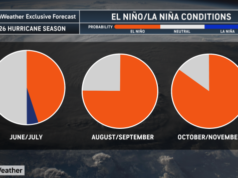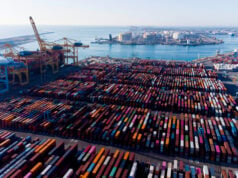U.S. stocks rocketed higher Wednesday after President Trump announced in a social-media post that he had authorized a 90-day pause on certain tariffs to most countries.
Volatility returned to the market, as stocks recovered after at least one false start in early trading. But at shortly after 1 p.m. in New York, the president’s post on Truth Social lifted the three major indexes into session highs.
“More than 75 Countries” Trump wrote, “have called to negotiate a solution..and have not, at my strong suggestion, retaliated in any way, shape, or form.”
Because of that, he wrote, “I have authorized a 90 day PAUSE, and a substantially lowered Reciprocal Tariff during this period, of 10%, also effective immediately.”
Earlier, Trump counseled cool and Treasury Secretary Scott Bessent told bankers “we are in pretty good shape” on the economy. Earlier, JPMorgan chief Jamie Dimon had said the economy was likely headed for a recession.
Trump’s reciprocal tariffs on nearly 100 nations took effect overnight, including a 104% tariff on Chinese imports. On Wednesday, Beijing said it would raise levies on U.S. imports to 84%, from 34%.
Also under scrutiny was the selloff in U.S. Treasurys. The yield on the 10-year note, the reference point for trillions of dollars in loans and securities, rose as high as 4.47% Wednesday before retreating somewhat after the 10-year Treasury note auction was met by strong demand.
Still, investors say there is broad nervousness about holding longer-term Treasurys ahead of government auctions Wednesday and Thursday. That anxiety contributed to a global stock selloff, with Japanese equities falling 3.9% and Europe’s main benchmark down nearly 3%.
Trump said Tuesday that levies on pharmaceutical imports will be announced “very shortly.” Pharma stocks such as Merck and Pfizer were down 3% early Wednesday.
In latest moves:
U.S. stock indexes soared. The Nasdaq climbed nearly 9%, the S&P 500 was up nearly 8% and the Dow Industrials rose 6%.
The WSJ Dollar Index weakened, extending declines from its January high. Deutsche Bank said the past week’s trading represents a “collapse in the price of all U.S. assets.” The Bank of England said the risk of more sharp corrections remains high.
Gold prices jumped. Continuous contracts for the precious metal, seen as a haven asset, rose to around $3,100 a troy ounce.
Brent crude futures, the benchmark for international oil prices, fell to a roughly four-year low, a sign of stress in markets and fear the economic outlook is dimming.
Vanguard cut its forecast for 2025 U.S. GDP growth to less than 1%, roughly a percentage point below its previous estimate. The new forecast assumes Trump will walk back some of his tariffs.
Japan’s top currency diplomat pledged to ensure stability in the global financial system, saying Tokyo will coordinate with other nations on how to handle U.S. tariffs.
🔎 WSJ reporters Gunjan Banerji and Ryan Dezember will answer questions on markets from 2 p.m. until 3 p.m. ET today. Submit your question here.
Disclaimer
Artificial Intelligence Disclosure & Legal Disclaimer
AI Content Policy.
To provide our readers with timely and comprehensive coverage, South Florida Reporter uses artificial intelligence (AI) to assist in producing certain articles and visual content.
Articles: AI may be used to assist in research, structural drafting, or data analysis. All AI-assisted text is reviewed and edited by our team to ensure accuracy and adherence to our editorial standards.
Images: Any imagery generated or significantly altered by AI is clearly marked with a disclaimer or watermark to distinguish it from traditional photography or editorial illustrations.
General Disclaimer
The information contained in South Florida Reporter is for general information purposes only.
South Florida Reporter assumes no responsibility for errors or omissions in the contents of the Service. In no event shall South Florida Reporter be liable for any special, direct, indirect, consequential, or incidental damages or any damages whatsoever, whether in an action of contract, negligence or other tort, arising out of or in connection with the use of the Service or the contents of the Service.
The Company reserves the right to make additions, deletions, or modifications to the contents of the Service at any time without prior notice. The Company does not warrant that the Service is free of viruses or other harmful components.













